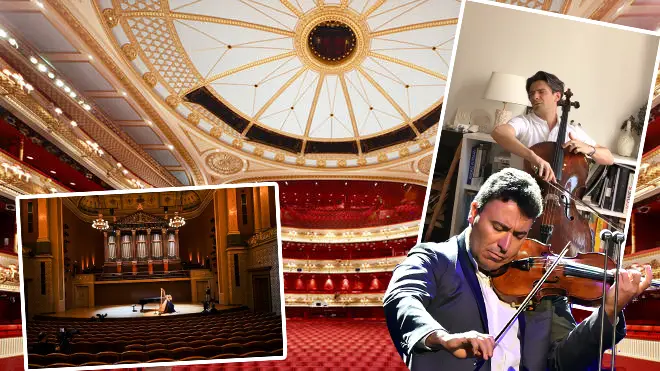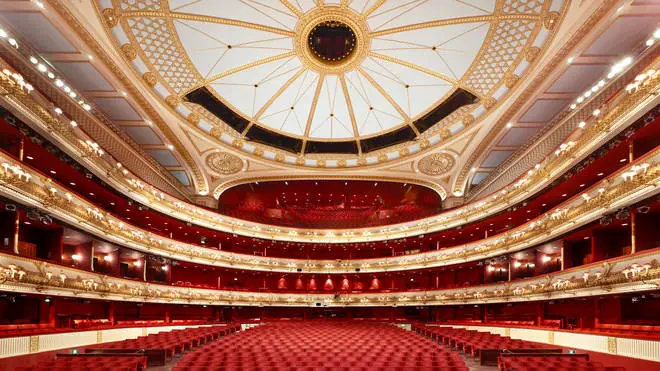On Air Now
Classic FM Breakfast with Dan Walker 6:30am - 9am
31 March 2020, 16:50 | Updated: 2 April 2020, 10:22

From world-famous artists putting their concerts at our fingertips, to musicians giving us rare personal insights into their off-stage selves, measures taken to slow the spread of COVID-19 have changed our experience of classical music radically.
The arrival and spread of coronavirus has ushered in a new way of living for people across the globe.
As governments have responded with social distancing and self-isolation measures to protect people from the new virus – including shutting pubs, clubs, theatres and restaurants, and strongly advising people not to see friends and family unnecessarily – more and more of us have found ourselves adapting to life lived just in our homes.
And while outside activities are restricted to exercise and food shopping, it’s never been a better time to find new amusements inside. Luckily, musicians have adapted quickly and are providing ample entertainment – from showing us how they’re practising with new furry co-workers, to live-streaming their very best performances.
Click here for the latest coronavirus advice from the NHS >
Here’s how their efforts have ushered in positive changes for classical music; changes that might not be – and in some cases hopefully aren’t – temporary.

When you’re a cellist stuck at home with a load of puppets…
More classical music venues, organisations and artists are making their concerts and productions available to watch online than ever before. Measures taken to stem the spread of COVID-19 have seen public events unable to go ahead, venues closed and musicians joining us behind doors self-isolating for safety.
Luckily, there are hours of concerts already available online or pre-recorded, and ready for viewing – from New York’s Met Opera and Russia’s Bolshoi Ballet, to the Liverpool Philharmonic and London’s Royal Opera House, there’s plenty out there to suit any taste.
And with thousands watching – the myth (in some cases) and reality of dwindling classical audiences – could be being challenged. A recent “living room” concert from Classic FM’s Artist in Residence Maxim Vengerov has been viewed by more than 20,000 people, with 1,500 peak live viewers – that’s more than can squeeze into many mid-sized concert hall.

Maxim Vengerov | Exclusive At-Home Concert | Classic FM Session
When violinist Maxim Vengerov performed from his living room last week (see above), viewers got to see him who usually might not have been in the right place in the world, might not have been able to afford it, or might not have secured tickets in time.
Others may have tuned in who would usually be put off by a classical concert hall. New audiences – used to sitting down to online episodes of their favourite soaps and series in the comfort of their home – may well be more tempted to try classical music in a more comfortable atmosphere; uninhibited by the real and perceived concert hall traditions that to many can be intimidating.
Read more: Watch Maxim Vengerov’s at-home concert for Classic FM >
An evening at the opera without worrying what you’re wearing on opening night? A Tchaikovsky Trio where you don’t have to panic if you make a noise – or even clap – between the movements? We’re all for it (but if you do like to get dressed up – you can still absolutely do that too).
my girlfriend and I WERE planning on dressing up, going out to a nice dinner and seeing the opera for our anniversary, but because of... well, you know, we had to improvise. pic.twitter.com/D60GpettFw
— Sara Patterson (@sarapatt) March 18, 2020
With world-famous venues like The Met and Royal Opera House offering up streamed concerts, we’re experiencing performances from inside venues we may not otherwise have visited, or at least had to plan a lot further in advance to visit were it in real life.
It’s a wonderful way to experience world-famous venues and tick them off your bucket list without breaking the bank (and having to leave the couch!).

The word “ensemble” literally means “together” in French, and coronavirus has all but stopped us getting together like we used to.
Read more: The best classical music being streamed online >
And yet, ensembles are still getting together. But instead of being in the same room as each other, musicians are transcending space and time and performing ‘together’ through video conferencing to audio calls. We’re celebrating this new meaning of “ensemble” – and applaud the new generation of click-track conductors.
When Nicola Benedetti, Alison Balsom and other leading musicians wrote to Boris Johnson imploring the government to support freelancers, they joined swathes of people drawing attention to the plight of musicians – and their near-total loss of work following concert cancellations and venue closures. They also reminded the government that “music is integral to our human experience, and our creative industries are a significant force for good in our country.”
The plight includes whole orchestras, and director of the Association of British Orchestras Mark Pemberton explains: “British orchestras are heavily dependent on earned income from ticket sales, international tours and recordings. With the forced closure of entertainment venues and recording studios, that income has plunged to zero.”
New funding initiatives have sprung up – such as those by Help Musicians, Performing Rights Society (PRS), Young Classical Artists Trust (YCAT), Arts Council England and Spotify, the latter of whom just announced they will match donations you make to Help Musicians, PRS and other organisations currently raising money for musicians during the coronavirus pandemic.
But, Pemberton says, while this funding help with short-term cashflow, “it will not solve the long-term damage” and could go further. It’s because of incredibly tough times at the moment, but drawing attention to the need for funding for music at any time is vital for any civilisation.
Quarantine measures have showed our most inspiring artists in a totally new light – off the big, shiny, gilded stages shrouded in red curtains and instead in living rooms, bedrooms and kitchens and through our pixelated phone screens. This has given us the kind of “human” access to our best performers that in many cases we have traditionally missed out on.
Artists have become our on-screen friends, and are showcasing human qualities – like wearing their “at-home” clothes (some go as far as pyjamas, watch above) and being surrounded by toddlers while they play – when we need those the most.

Lizzo plays the flute and guides a meditation to 'promote healing during this global crisis'
Lots of new compositions have already been inspired by the challenging experiences we’re having. From Thomas Hewitt Jones’s Solidarity to Dani Howard’s recent “little musical message to the world”, composers are being inspired to express what we’re going through in new pieces of music.
Hewitt Jones said of his piece: “I wanted to write something to express solace and hope, and help bring people together in an uncertain moment for the world when so many feel unsettled.”
Composer Daniel Kidane has also been inspired to write and guitarist Sean Shibe recently premiered his piece, Continuance, for four electric guitars on YouTube.
A little musical message to the world 🌎 🌱 #stayhome
— Dani Howard (@DaniHoward6) March 24, 2020
Please share 🙏🏻 pic.twitter.com/bOmCoydw3U
While leading advocates like Nicola Benedetti and Sheku Kanneh-Mason are among scores of musicians championing music education all the time, it seems at the forefront of people’s minds as much in coronavirus times as ever.
Celebrities like Joe Wicks and Classic FM’s Myleene Klass have turned to providing online lessons in their field, and many music teachers have taken their teaching rosters online as well.
Skype lessons have become the norm in the new at-home lives we’re leading, and parents with children at home due to school closures, especially, are shouting about music education’s importance. Organisations like London Music Masters have online learning resources, and it has just announced that its waiving the fees for its 2020/21 ‘Team Teach’ teacher training course.
“Thank you, thank you, thank you!” one mum wrote to Myleene after taking part in her ‘Klass’. “My daughter started piano two months ago and was just getting into a rhythm with her lessons and this will be just perfect.”

Quarantined Italian tenor passionately sings 'Nessun Dorma'
Many of the impacts of the coronavirus pandemic on classical music are of course devastating (musicians’ concerts cancelled and their livelihoods at stake), disheartening (festivals no longer going ahead and hard work behind the scenes being abruptly stalled), and unprecedented (concert halls and venues closed until further notice around the world), following government advice to stem the spread of COVID-19.
Read more: Classical artists says “Every musician I know is now facing bankruptcy” >
But there is, and must be, hope. Here’s what you can do to help:
• Point musician friends to Help Musicians where they can find the latest advice on coronavirus, apply for Health and Welfare Support, and access mental health support through Music Minds Matter, in the face of the coronavirus crisis.
• Consider donating the price of your ticket back to performers, orchestras, organisations and venues for any concerts you were going to that have been cancelled. Most will have details of how to do this on their websites, so do look out for that.
• Donate to artists and classical music organisations raising funds for those affected by coronavirus, including Help Musicians, PRS, YCAT, and others you may have come across (see above).
• Reach out to any musician, artist, actor or other freelance friend or family member you know – and ask. Ask “How can I help? Where can I go to donate? What can I do for you?” And – crucially – ask “Are you okay?”.
• Visit the Arts Council England website to find out more about how to help musicians.